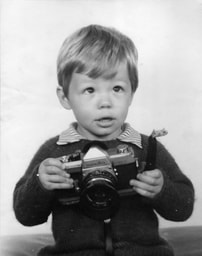Topic 1: Forum Find the oldest photograph in your archive and share it in the forum below. Add 250 words (maximum) that reflect on:
My response: The oldest photograph I could find in my archives is this one of me taken in my parents photography studio in Kettering when I was about two years old (approx. 1966). I have a scanned copy on my computer, but my mother has the original photograph in a vast collection of family photographs. Knowing her, the negatives are also probably filed away somewhere as well! I have boxes of albums of my own photographs I have taken over the years since getting my first camera, a Kodak 126 Instamatic when I was about 10 years old. I was never very good at labelling or dating photos so I have found albums full of photos that I have no idea when or where they were taken! At least one day after I am gone someone will discover them in the attic and the photos can still be viewed, whereas with the abundance of digital media stored on computer hard drives or on cloud storage or social media platforms, how will future generations be able to access these images? The camera in my hands is a Minolta SR-1, of which I have a version in my camera collection. A great solid all manual camera with no electronics to go wrong! Peer comments: Love the photo Paul. There is something great about seeing kids with cameras, especially, as you say, great solid manual cameras with no electronics to go wrong.I love the idea that you perceive your analogue archive to be discovered in an attic in years to come. I've never though of a box of photos that way before. The strange thing is however, I've bought old photo albums with contain pictures that I didn't take and even contain family photos (not even my family....absolute strangers in fact!) Cameras built to last! I really wish I'd not sold my Nikon F1. But I have kept up photo albums since I met my wife at university. Does anyone else I wonder. As you say, who will be able to (or want to) forage through thousands of digital files? In favour of the digital side of things, I think having organized libraries of imagery on Lightroom, Instagram and Facebook, and Google photos (not that I use FB or IG anymore) is much easier to find. I often get google reminders which show me photo's taken on the same day in the last month, year and previous years etc., and it's always a lovely treat looking through them. I don't know If I would go to the effort of climbing through my attic and looking through older stuff. I also think that face tracking allows you to pick out particular people/ or photos taken in one place much more straightforwardly. I wonder if people will pick up old HDDs in the future and scourage them in the same way we do boxes of photo albums. I like to imagine how technology will continue to evolve as programs get better at organizing our photo's in the future! Cute picture, Paul! I was thinking the same thing when I was going through the albums. So much is stored on digital and so many drives to go through. I feel like a lot of history is lost because of the digital age. I spent many Saturday mornings between 2005 and 2010 scanning photographs in order to create digital copies. However, at that stage, I had no knowledge of image size or quality issues etc so some of the scans are not that good although 'good enough'. I can't go back and re-scan because once I'd scanned them all, I threw away all the originals to make space in my study for other things. I do have several books of well-ordered and labelled negatives but have no idea where they are after the last house move. Topic 1: ActivityPlease aim to carry out three photo sessions relating to your research topic. The definition of 'photo session' here depends on your practice, but it could mean a photo-walk, time spent with a model, a mini-assignment, studio time or darkroom printing.
For your photo sessions, choose one strategy from the toolbox and make new work that relates to your research goals. Alternatively, you could choose a strategy not included in the toolbox or devise a new one. At this stage, there doesn't have to be a direct and obvious connection between the strategy and the new work. However, as the module progresses you may find it helpful to reflect critically on such connections. Drawing from your new work and the broader contexts of your research topic, make a short trailer video that gives an 'appetiser' of what you may (or may not) explore during the rest of the module.
0 Comments
Leave a Reply. |
AuthorWrite something about yourself. No need to be fancy, just an overview. ArchivesCategories |

 RSS Feed
RSS Feed